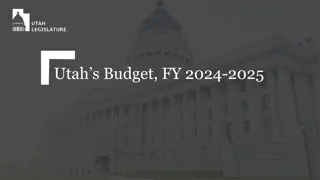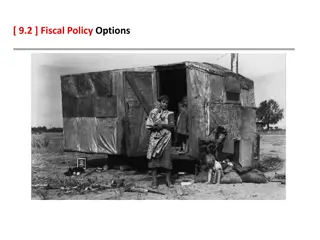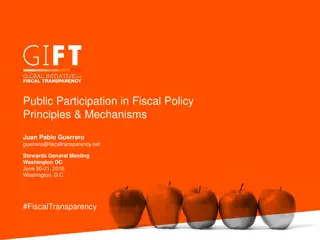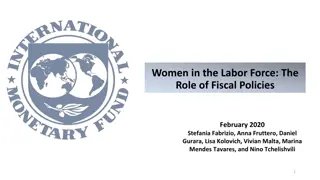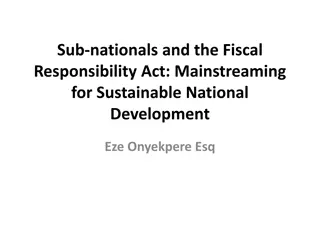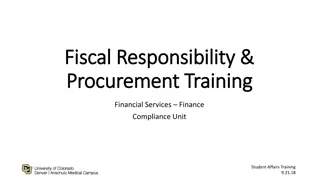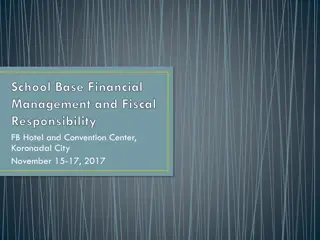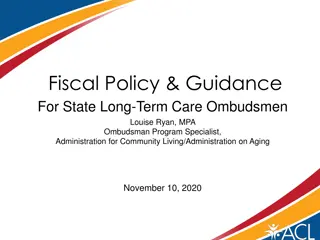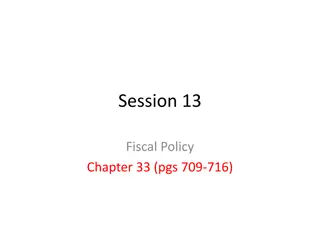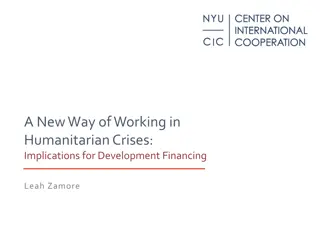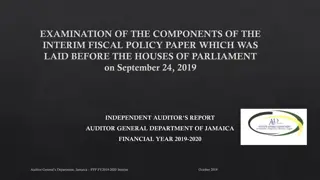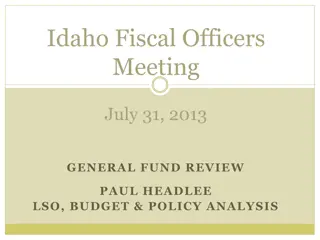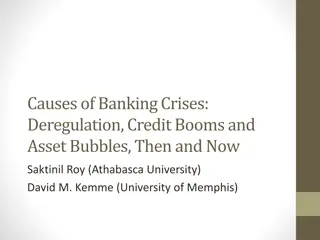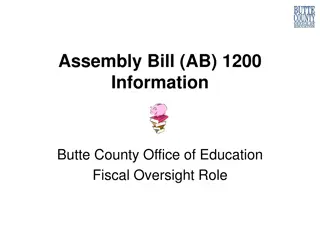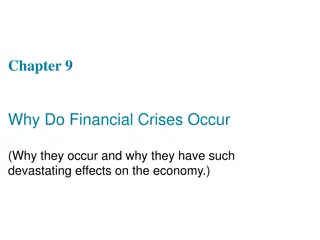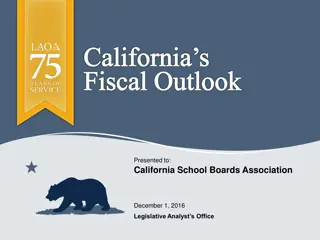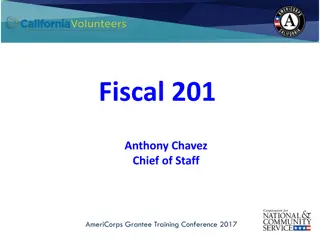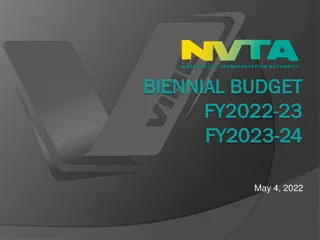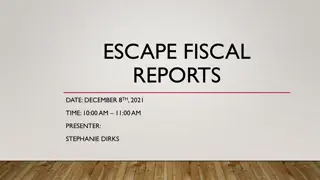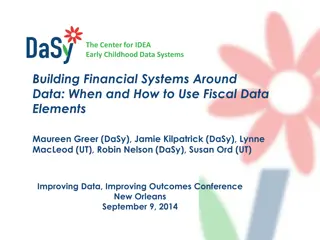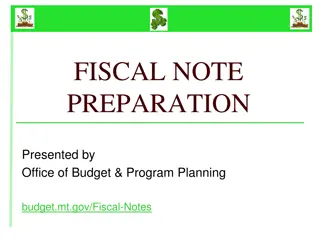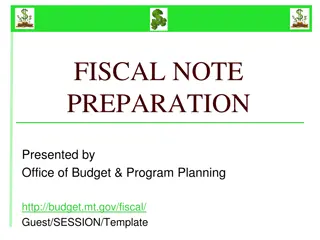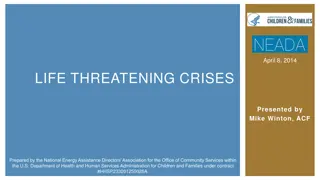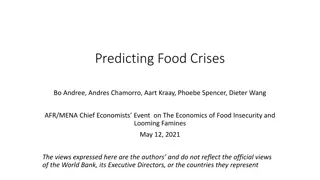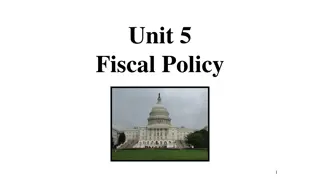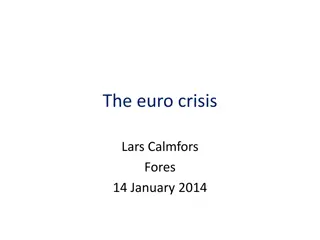Relevance of Countercyclical Fiscal Policy and Fiscal Acyclicality
This literature review examines the effectiveness of countercyclical fiscal policies in stabilizing output and enhancing welfare, with a focus on the correlation between public spending cycles and GDP cycles. The study analyzes examples from Sweden and Argentina to showcase the impact of fiscal poli
1 views • 29 slides
Overview of Utah's Budget for FY 2024-2025
Utah's budget for the fiscal year 2024-2025 is outlined with details on revenue sources, budget priorities, special funding, long-term fiscal health, and budget process changes. The budget allocations cover various sectors including education, transportation, law enforcement, social services, and mo
0 views • 32 slides
Understanding Fiscal Policy Options in Economics
Explore the evolution of economic theories including classical economics, demand-side economics, and supply-side economics. Learn about the impact of key figures like John Maynard Keynes and Milton Friedman on fiscal policy decisions and the U.S. economy. Delve into the strategies employed during th
0 views • 18 slides
Insights from Evaluation of Previous Humanitarian Crises and Core Humanitarian Standards
Evaluation of past crises reveals the importance of core humanitarian standards in providing timely, coordinated, and effective assistance. Learning from experience, feedback mechanisms, and competent staff are key for addressing humanitarian crises. Data and systems play a crucial role in monitorin
0 views • 13 slides
Principles of Public Participation in Fiscal Policy
The work by GIFT focuses on developing principles for public participation in fiscal policy, emphasizing the importance of citizen engagement beyond mere disclosure. These principles aim to enhance accountability, uphold citizens' rights, and improve policy quality through inclusiveness and openness
0 views • 17 slides
Gender-Responsive Fiscal Policies and Female Labor Force Participation
Despite persistent gender gaps in labor force participation and wages, various fiscal policy measures have been adopted globally since the mid-1980s to address these disparities. Understanding the impact of gender-responsive fiscal policies on female labor force participation, economic growth, incom
0 views • 23 slides
Fiscal Responsibility Act & Sustainable Development Nexus
Sustainable development integrates environmental health with economic progress. Achieving SDGs requires fiscal responsibility at all levels of governance. Subnational fiscal irresponsibility impacts national growth. It is crucial to manage public resources effectively to attain sustainable developme
0 views • 48 slides
Financial Responsibility and Procurement Training Overview
This overview covers key aspects of financial responsibility, procurement training, and fiscal roles within a university setting. It emphasizes protecting university resources, ensuring compliance with laws and regulations, and upholding ethical standards. It discusses the responsibilities and roles
0 views • 33 slides
Enhancing Fiscal Policy Planning through Public Participation and Transparency
Explore the importance of public participation and meaningful transparency in fiscal policy planning and public expenditure management. Learn about the GIFT Network, its champions and stewards, and how fiscal transparency and public participation can lead to improved fiscal and development outcomes
0 views • 22 slides
School-Based Financial Management and Fiscal Responsibility in Education Governance
School-Based Financial Management and Fiscal Responsibility is crucial for the effective operation of educational institutions. With the implementation of shared governance principles and fiscal autonomy under the School-Based Management System (SBM), schools can efficiently manage their financial r
0 views • 15 slides
Fiscal Policy Guidance for State Long-Term Care Ombudsmen
Overview of the fiscal management responsibilities for State Long-Term Care Ombudsmen under the Older Americans Act requirements. Covers topics such as fiscal management, funding allocations, state plan requirements, and fiscal responsibilities. Details the OAA and LTCOP rule provisions related to f
6 views • 22 slides
Understanding Fiscal Policy: A Comprehensive Overview
Fiscal policy involves changes in government spending and taxes to influence macroeconomic objectives like employment, price stability, and economic growth. It includes expansionary and contractionary policies to manage aggregate demand and stabilize the economy. This overview covers types of fiscal
0 views • 24 slides
Principles of Fiscal Deficits and Debt Management According to Kalecki
Economist Kalecki advocated for a permanent regime of fiscal deficits to manage public debt, emphasizing the importance of debt management for liquidity in the financial system. His principles involve splitting the government budget into functional and financial parts, each influencing aggregate dem
0 views • 6 slides
Post Award Fiscal Compliance: Who We Are and What We Do
Post Award Fiscal Compliance (PAFC) assists campus and central administrative units in mitigating non-compliance risks with sponsor terms and conditions by monitoring compliance, interpreting award requirements, providing training, and enhancing internal controls. The team includes Matt Gardner, Ass
0 views • 11 slides
Management Strategies for Crisis in Tourism Industry
Explore the crucial role of crisis management in the tourism sector, understanding how internal and external shocks impact the industry. Discover the ripple effects of crises on a global scale and delve into various approaches to studying and managing crises effectively. Gain insights into the lifec
0 views • 9 slides
Innovative Approaches in Humanitarian Crises and Development Financing
This study explores the New Way of Working in humanitarian crises, focusing on reinforcing national systems, anticipating crises, and transcending humanitarian-development divides. Promising trends include rising government ownership and increased linkages between humanitarian activities and governm
0 views • 6 slides
Year-End Closing Checklist for School Fiscal Services
Review key areas such as tax revenue, grants, grant revenue, lease rental fund revenue, accruals, deferred outflow, liabilities, and deferred inflow to properly prepare for the year-end closing in school fiscal services. Ensure accuracy in financial records and compliance with regulations for a smoo
0 views • 21 slides
Economic Recovery and Fiscal Stability in Uruguay: Budget Law and Monetary Policy Framework 2020-2024
The Budget Law and Monetary Policy Framework in Uruguay for 2020-2024 focus on restoring fiscal consolidation, stabilizing debt, and implementing market-friendly policies for economic recovery. Successful COVID-19 containment strategies have allowed for a faster normalization of economic activity. L
2 views • 35 slides
Examination of Interim Fiscal Policy Paper for Financial Year 2019-2020
An independent auditor's report on the interim fiscal policy paper laid before the Houses of Parliament, confirming compliance with the requirements of the FAA Act. The report assesses the components, conventions, and assumptions underlying the paper for fiscal responsibility, macroeconomic framewor
1 views • 15 slides
Idaho Fiscal Officers Meeting - General Fund Review July 31, 2013
Fiscal officers in Idaho reviewed the General Fund for the fiscal year 2013, analyzing revenue growth, transfers, appropriations, and historical data. The meeting discussed actual revenue figures, beginning balances, cash reversions, budget stabilization funds, total appropriations, and estimated en
0 views • 5 slides
Analysis of Banking Crises: Deregulation, Credit Booms, and Global Impacts
This study delves into the causes and patterns of banking crises, focusing on deregulation, credit booms, and asset bubbles. It compares the global financial crisis of 2008-2009 with historical crises worldwide, highlighting common factors leading to such events. The research discusses the role of l
0 views • 23 slides
Butte County Office of Education Fiscal Oversight Role Overview
The Assembly Bill (AB) 1200 provides insights into the fiscal oversight role of Butte County Office of Education (BCOE). It outlines the responsibilities of local boards of education, BCOE as an intermediary agent, and the creation of the Financial Crises and Management Assistance Team (FCMAT) in 19
0 views • 12 slides
Understanding Financial Crises and Their Impacts
Financial crises arise due to disruptions in financial markets, leading to severe economic consequences. This text delves into the definition, stages, causes, and effects of financial crises, with a focus on the global financial crisis of 2007-2009 and the European Sovereign Debt Crisis. It also dis
0 views • 28 slides
California's Fiscal Outlook Presentation to California School Boards Association
California's fiscal outlook was presented to the California School Boards Association by the Legislative Analyst's Office in December 2016. The report highlights a decrease in revenues and expenditures for the 2016-17 fiscal year, leading to a revised reserve down by $1 billion. However, the state i
0 views • 22 slides
AmeriCorps California Volunteers Fiscal Training Conference 2017 Details
In July 2017, the AmeriCorps Grantee Training Conference took place, focusing on fiscal procedures, compliance, desk reviews, and monitoring. The conference covered topics such as improper payments elimination, common audit findings, and the fiscal desk review process implemented by California Volun
2 views • 22 slides
Gender Equality in Humanitarian Crises: Empowering Women and Girls
Addressing gender equality in humanitarian crises is crucial for empowering women and girls. Access and participation in facilities and activities, meaningful participation, dignity, and empowerment are key aspects to consider. Women's empowerment spans various spheres and requires holistic approach
0 views • 33 slides
Fiscal Year 2023 Budget Overview
The content presents detailed information on the fiscal year 2023 budget, including budget cycles, comparisons between fiscal years, source of funds, expenditure plans, and top projects for the Consolidated Municipal Agency (CMA). It covers budget development processes, funding sources, expenditure
0 views • 11 slides
Emerging Markets Investors Alliance and GIFT: Promoting Fiscal Transparency
The Emerging Markets Investors Alliance, in partnership with GIFT (Global Initiative for Fiscal Transparency), aims to educate institutional investors about fiscal transparency and facilitate investor advocacy with governments. Through roundtable discussions and engagements with finance ministers, t
0 views • 5 slides
Understanding Fiscal Reports and Budgeting Process
Dive into the world of fiscal reports and budgeting with a presentation led by Stephanie Dirks. Explore the Budget Code Story, different types of reports, and examples of Fiscal 04 & Fiscal 06 reports. Learn about Fund allocations, Object Codes, and responsible oversight of funds. Get insights into
0 views • 17 slides
Understanding Fiscal Pro-cyclicality and Optimistic Forecasts in Developing Economies
Fiscal policy in developing countries has historically shown pro-cyclical tendencies, exacerbating economic cycles. Leaders often fail to utilize periods of economic booms to strengthen budgets, leading to over-optimistic forecasts. However, some countries have managed to break this pattern by runni
0 views • 33 slides
Building Financial Systems Around Fiscal Data in Early Childhood Programs
Understand the importance of fiscal data in program management, identify key fiscal data elements, address policy questions, and learn from a state's cost study design. Explore the significance of fiscal data for decision-making, policy development, and program management, with a focus on revenue so
0 views • 31 slides
Global Practices in Fiscal Rule Performance
The study explores the implementation and impact of fiscal rules on macro-fiscal management, focusing on international experiences. It discusses the presence and compliance with fiscal rules, highlighting differences in pro-cyclicality among small and large countries. The rise in adoption of nationa
0 views • 23 slides
Understanding Fiscal Notes in Government Legislation
Fiscal notes are essential documents accompanying bills affecting finances of state entities. They detail revenue, expenditure, and fiscal impact, requiring a 6-day processing timeline. The need for a fiscal note may be determined by legislative services, committees, sponsors, or agencies. The proce
1 views • 30 slides
Fiscal Note Preparation Process and Guidelines
Fiscal notes are essential for bills affecting state finances. This includes the total processing time, exceptions, and what to do if there is disagreement on the fiscal note. The process involves multiple steps, including drafting, review, and resolution of disagreements. The President of the Senat
0 views • 29 slides
Managing Life-Threatening Crises in Energy Assistance Programs
This document outlines statutory requirements, intervention concepts, crisis components, definitions of crisis and life-threatening crises, and the process of applying for crisis assistance in energy-related emergencies. Grantees must act promptly to resolve crises within specific timeframes, ensuri
0 views • 17 slides
Predicting Food Crises: A Comprehensive Analysis
Food insecurity is a significant issue, especially in developing regions like Africa, exacerbated by factors such as climate change and population growth. Despite the importance of early prevention, there is limited literature on predicting food crises, unlike conflict outbreaks. This study by Bo An
0 views • 15 slides
Understanding Government Tools for Economic Stability
The government uses fiscal and monetary policies to stabilize the economy. Fiscal policy involves Congress's actions through government spending or taxation changes, while monetary policy is driven by the Federal Reserve Bank. Discretionary fiscal policy involves new bills designed to adjust aggrega
0 views • 36 slides
Impact of Banking Crises on the Real Economy: Lessons from History
Understanding the influence of banking crises on the real economy, particularly during the Great Depression, where massive bank suspensions triggered economic turmoil. The interplay between banking panics, monetary deflation, bank failures, loss of credit information, and debt deflation worsened the
0 views • 55 slides
Cuba and Venezuela: Contemporary Crises Analysis
Analyzing the contemporary crises in Cuba and Venezuela, this study delves into the deep-rooted issues affecting both countries. From economic struggles to demographic challenges and political alliances, the research highlights the key factors contributing to the crises. Despite attempts at reforms
0 views • 35 slides
Understanding the Euro Crisis: Interrelated Challenges and Strategies
The Euro crisis, analyzed through government bond yields, interrelated crises (sovereign debt, bank, growth, and competitiveness crises), government debt dynamics, and strategies to tackle sovereign debt crises with rescue loans and fiscal austerity conditions. The interconnected nature of the crise
0 views • 20 slides

